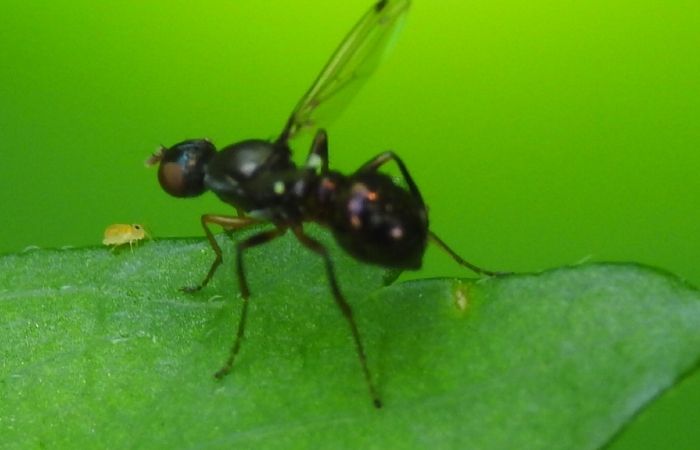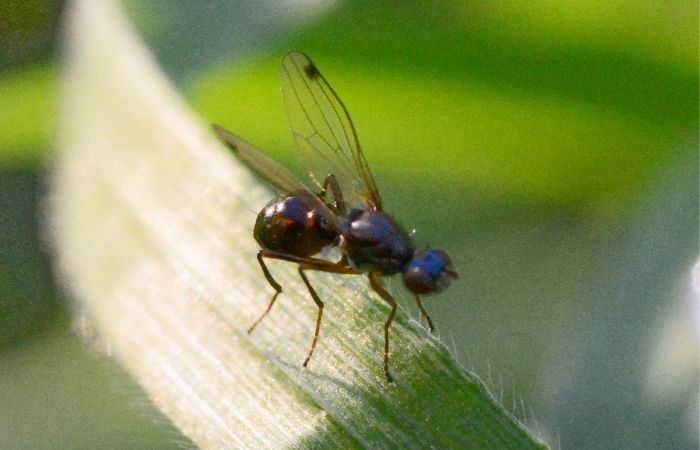
Do midges bite dogs? It’s a question that has probably crossed the mind of many dog owners. The answer, unfortunately, is yes – midges will bite dogs if given the opportunity. In fact, any mammal is fair game for these pesky little insects, which is why it’s important to take steps to protect your pup from them.
| Note: If you are experiencing a midge or any kind of insect problem with your dogs, then check out the Best Dog Insect Control Sprays |
What are Midges?
Midges, also known as “no-see-ums,” are a type of fly that can be found all over the world. They are usually very small, and many people mistakenly confuse them with mosquitoes. Midges do not bite humans, but they can bite dogs.

Do they Bite Dogs?
Yes midges do bite dogs!
They bite dogs and other animals and are most active during the day. You can get rid of them by spraying your dog with a strong insect repellent.
Can Dogs Get Midge Bites?
Some dog owner asks can dogs get midge bites?
Yes, dogs can get midge bites. Midges are tiny, delicate flies that are attracted to moisture and sweat. They often swarm around people and animals in the summertime, and their bites can be quite irritating.
Midge bites usually cause a small red bump on the skin that is itchy and may become inflamed or infected if scratched or bitten again. Dogs are particularly susceptible to these bites because they tend to have more moisture on their skin than people do, and they also spend a lot of time outside rolling around in the grass and dirt where midges like to congregate.
There is no real cure for midge bites other than taking steps to avoid them in the first place. keeping your dog well-groomed and free of dirt and debris will help to keep midges away, and using a repellent spray on your dog’s coat before going outdoors can also be effective. If your dog does get bitten by midges, try to resist the urge to scratch the bites as this can only make them worse. Applying a cool compress to the area may help to soothe the itchiness. If the bites seem to be causing your dog a lot of discomfort, or if they start to show signs of infection, then it’s best to take them to see the vet for treatment.
Do Flies Bite Dogs?
Flies, particularly certain species like stable flies and black flies, are known to bite dogs. These insects can be a nuisance to dogs, causing discomfort and potential health issues. Flies are attracted to dogs by their body heat, odors, and exhaled carbon dioxide. They tend to bite exposed areas of a dog’s body, such as the ears, nose, and belly. Fly bites can result in symptoms such as itching, redness, swelling, and irritation.
In some cases, dogs may develop allergic reactions to fly bites, leading to more severe symptoms. It’s important for dog owners to take preventive measures to minimize fly bites, such as using fly repellents specifically formulated for dogs, keeping their living areas clean and free of rotting organic matter, and providing shade and protection from flies.
If a dog experiences significant discomfort or shows signs of an allergic reaction due to fly bites, it is advisable to consult a veterinarian for appropriate treatment options.
Identification of Midges Bite Dogs
Midge Bites on Dogs
Midges, also known as “no-see-ums,” are tiny flying insects. Midges are most active in the early evening and at night. They are attracted to light and heat, so they may fly into homes or yards that have lights on or are warm. Midges can bite dogs anywhere on their body, but they tend to prefer the ears, nose, and eyes. Dogs may scratch or lick the bites, which can lead to infection.
What are the types of midge larvae? Midges are small insects in the order Diptera. They belong to the family Chironomidae, which includes many other flies. The larvae of midges resemble little worms or maggots, but they do not have a mouth or gut. They are born with mouth hooks, which they use to feed on algae and other organic matter. The larvae of midges have three main body segments and two pairs of legs, but they lack a head. They eat by piercing plant tissue with their mouth hooks and sucking out the juices.
Are Midges Dangerous to Dogs?

Dogs can be affected by the bite of an insect. These bites usually leave no visible marks, but they can still pose a serious risk to the health of a dog. If a midge bites the skin of a dog, it can enter the blood circulation and produce a life-threatening condition called Systemic Insect Bite Reaction.
How to Treat Midge Bites on Dogs
Midges are tiny insects that can cause allergic reactions in dogs. However, most dogs don’t react to midge bites, so it can be hard to tell if a bite is from a midge. The best way to determine if a bite is from a midge is by observing the bite site. If it looks like a mosquito bite, it’s probably from a midge. If your dog has a rash on its neck, or other areas, it could be an allergy.
The most common symptoms of midge bites include:
- Redness of the skin
- Swelling
- Itching
- Nausea
- Fever
Your vet can determine whether your dog has midge bites by examining your dog and checking the bite area for signs of swelling or redness.
How to Prevent Dog Midge Bites
(Check out Midge Repellent for Dogs)
Here is a detailed guide on how to prevent dog midge bites, ensuring the well-being of your furry friend.
Understanding Midge Habitats
Midges typically breed and thrive in areas with standing water, such as streams, ponds, marshes, mud, compost, and rotting wood. They are most active around dusk, making it essential to be aware of their habitats and peak activity times to minimize your dog’s exposure to these pesky insects.
Grooming and Hygiene
Keeping your dog well-groomed and free of dirt and debris can help deter midges from biting. Regularly brushing your dog’s coat and bathing them with a gentle pet shampoo can contribute to maintaining a clean and healthy coat, making it less attractive to midges.
Use of Repellent Sprays
Applying a repellent spray specifically designed for dogs on your pet’s coat before going outdoors can be an effective way to prevent midge bites. It is crucial to choose a product that is safe for dogs and follow the manufacturer’s instructions for application. Consult your veterinarian for recommendations on suitable repellent sprays.
Protective Clothing
Consider using protective clothing for your dog, such as a lightweight, breathable, and insect-repellent coat or vest. This can provide an additional barrier against midges and other biting insects, reducing the chances of your dog getting bitten.
Avoiding High-Risk Areas and Times
As mentioned earlier, midges are most active around dusk and in areas with standing water. Avoid taking your dog for walks during these peak times and steer clear of high-risk areas to minimize the likelihood of midge bites.
Home and Yard Maintenance
Eliminating wet areas and standing water around your home can help limit the number of midges in your environment. Regularly clean and maintain your yard, removing any debris, stagnant water, and potential breeding grounds for midges.
Using Fine Mesh Screens
Midges are small enough to fit through average window screens. If midges are a problem indoors, consider investing in extra fine mesh screens for your windows and doors to prevent them from entering your home.
Conclusion: Do Midges Bite Dogs?
Midges are attracted to the carbon dioxide that we exhale, as well as body heat and moisture. Dogs unfortunately provide all of these things in abundance, making them prime targets for midge bites. While it is impossible to completely protect your dog from midges, there are a few things you can do to help reduce the chances of a bite. Keeping your dog indoors during peak biting hours, using an insect repellent specifically designed for dogs, and keeping them clean and free of excess moisture will all help to minimize the risk of a nasty bite.
FAQs
Do dogs need midge repellent?
Yes, dog safe insect spray is necessary for dogs from preventing midge bite.
What keeps biting midges away?
To repel biting midges, use insect repellents with DEET, picaridin, or oil of lemon eucalyptus. Wear long clothing and light colors to minimize skin exposure. Avoid outdoor activities during dawn and dusk. Keep doors and windows closed, or use screens to create a barrier. Remove stagnant water sources and use fans or air conditioning. Natural repellents like citronella, lavender, or eucalyptus may help. Employ these strategies to reduce midge bites effectively.